A relationship between the Miller School and Cedars has existed for many years, but opportunities for expansion under the new University ownership have invigorated Miller School departments, including Medicine, Urology, Orthopaedics, Neurology, and Surgery, five of the pillars of patient care. Here, the chairs of these departments comment on new and expanded services at University of Miami Hospital.

Surgery
Alan Livingstone, M.D., Lucille and DeWitt Daughtry Professor and chairman of the DeWitt Daughtry Family Department of Surgery
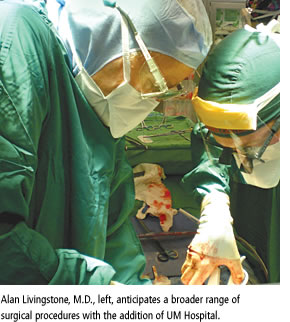 “The Department of Surgery is fortunate because we are at the intersection of the University of Miami and Jackson Memorial Hospital (JMH), and we always will be. We look upon the addition of UM Hospital as an opportunity to more appropriately align resources, which will also allow us to increase what we do at Jackson in signature programs like transplantation. “The Department of Surgery is fortunate because we are at the intersection of the University of Miami and Jackson Memorial Hospital (JMH), and we always will be. We look upon the addition of UM Hospital as an opportunity to more appropriately align resources, which will also allow us to increase what we do at Jackson in signature programs like transplantation.
“The addition of beds at UM Hospital will help alleviate the shortage we currently face, allowing us to accept patients expeditiously any time someone wants to refer them to us. This will expand our referral pattern, bringing in a greater breadth of patients, which will in turn enhance the training of our residents.
“The addition of UM Hospital will allow us to build new programs such as bariatric surgery, which could not previously be accommodated at Jackson because of bed constraints. To lead the effort in this area, we’ve recruited Atul Madan, M.D., as the new chief of laparoendoscopic and bariatric surgery.
“It is important that academic medical centers generate new knowledge and develop better methods for caring for patients. One focus is our work on applications that advance the field of minimally invasive surgery, including the use of robotics. The new four-arm robots at both UM Hospital and JMH will be used to advantage in the fields of urology, gynecology, otolaryngology, and cardiac surgery, and we are in the process of recruiting a world leader in robotic cardiac surgery to further strengthen our team.”
Medicine
Marc Lippman, M.D., Kathleen and Stanley Glaser Professor and chairman of the Department of Medicine
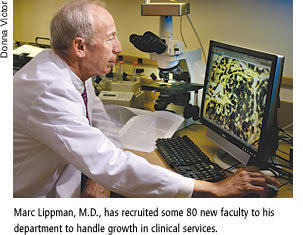 “Our department will be a major player at UM Hospital in a couple of areas. The Cardiovascular Division is going to account for a large part of the hospital’s growth; it will include an outpatient component with leading-edge imaging, cardiac catheterization labs, and electrophysiology labs as well as world-class in-patient services. We are also planning an ambitious joint venture with Jackson to build an extensive bone marrow transplant program at UM Hospital. “Our department will be a major player at UM Hospital in a couple of areas. The Cardiovascular Division is going to account for a large part of the hospital’s growth; it will include an outpatient component with leading-edge imaging, cardiac catheterization labs, and electrophysiology labs as well as world-class in-patient services. We are also planning an ambitious joint venture with Jackson to build an extensive bone marrow transplant program at UM Hospital.
“It’s always been one of my dreams to create an academic entity that involves scholarly work on patient outcomes, safety, and best practices. To that end, we’ve hired Amir Jaffer, M.D., as chief of the Hospitalist Service, perhaps the first division of its kind in the country. In addition to working with all medical admissions, the Hospitalist Service will supply day-to-day pre- and post-operative care to an increasing number of surgical patients, and it will maximize care for patients who are at higher risk for surgery.
“We also have a host of new recruits—about 80 overall for the department, including six new division chiefs.
“Often the people most important to driving business are referring physicians. One of the major goals of the department is to build a network of primary care and sub-specialty care that will not only provide access for patients but will also have a major impact on the activities within UM Hospital.”
Urology
Mark S. Soloway, M.D., professor and chairman of the Department of Urology
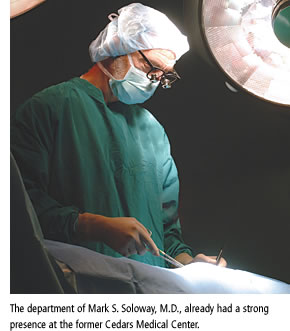 “When I came here in 1992, we were already one of the four departments at the Miller School—along with medicine, dermatology, and orthopaedics—that had already started working at Cedars. “When I came here in 1992, we were already one of the four departments at the Miller School—along with medicine, dermatology, and orthopaedics—that had already started working at Cedars.
“The Department of Urology is strong in several areas, including urologic cancer, voiding dysfunction, and minimally invasive surgery. We’ll continue to build on that at UM Hospital.
“There are eight of us who do surgery related to kidney cancer, prostate cancer, and bladder cancer, and we’re busy recruiting to expand in this area. One of our new recruits is Aaron Berger, M.D., who is trained in laparoscopic and minimally invasive surgery; he will join the team in August.
“Currently our academic office is at Dominion Tower, our clinical office is at the Professional Arts Building, and the Batchelor Urology Diagnostic Center is at Jackson. I think the future of the department involves expanding our services at UM Hospital while continuing our extensive presence at Jackson. What we would love to do is to create a urology institute.
“Robots are being used in urology, particularly in the treatment of prostate cancer. There is a robot at Jackson and there is a robot at UM Hospital, so the resource is already there. We’re also purchasing state-of-the-art endoscopic equipment to manage diseases of the lower urinary tract.
“Urology has been one of the busiest services at UM Hospital, and we certainly have every expectation to continue to be—we’re particularly suited for growth in South Florida, with its large number of residents over the age of 50. With this in mind, I think the growth of the department will be a main focus for the hospital.”
Orthopaedics
Frank J. Eismont, M.D., Miller Professor and chairman of the Department of Orthopaedics
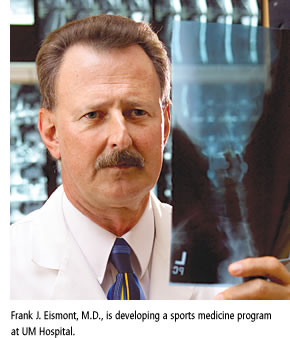 “The UM faculty in the joint reconstruction service and musculoskeletal oncology service have had a major presence at the former Cedars Medical Center for more than 15 years. To accommodate the growing practices of these and other orthopaedic services, three years ago the department opened a newly designed orthopaedic clinic that is located just off the lobby of UM Hospital. “The UM faculty in the joint reconstruction service and musculoskeletal oncology service have had a major presence at the former Cedars Medical Center for more than 15 years. To accommodate the growing practices of these and other orthopaedic services, three years ago the department opened a newly designed orthopaedic clinic that is located just off the lobby of UM Hospital.
“We are developing a major joint center under the direction of Sean Scully, M.D., Ph.D., and expanding the oncology service under the leadership of H. Thomas Temple, M.D. We anticipate doubling the number of faculty in these specialties over the next two years. We have already recruited Sheila Adams, M.D., in musculoskeletal oncology, and Seth Williams, M.D., who will join our spine surgery service.
“A very exciting area for growth at UM Hospital is in the area of sports medicine. Sports medicine is one of the most high-profile services in any major hospital. Over the next year, we will develop a leading-edge, comprehensive sports medicine center with the most modern ambulatory operating rooms. It will be a multiphysician division, including operative as well as non-operative positions, and will treat athletes of every age and every level of sports expertise as well as the general population.
“Our emphasis on applying the latest research to patient evaluation and management and the availability of UM Hospital will allow the Department of Orthopaedics to provide the best care to a broader patient community.”
Neurology
Ralph L. Sacco, M.D., M.S., Miller Professor of Neurology, Epidemiology and Human Genetics, and chairman of the Department of Neurology
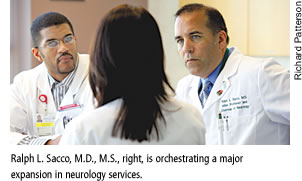 “The Department of Neurology is under-going a major expansion in a variety of areas. We are expanding our stroke, critical care, movement disorders, sleep, epilepsy, multiple sclerosis, and neuro-oncology areas. UM Hospital will help us keep up with the clinical demand in this rapidly growing metropolitan area. Neurology, however, is still very much committed to the Neuroscience Intensive Care Unit at Jackson Memorial Hospital, where the bulk of our programs will be expanded. “The Department of Neurology is under-going a major expansion in a variety of areas. We are expanding our stroke, critical care, movement disorders, sleep, epilepsy, multiple sclerosis, and neuro-oncology areas. UM Hospital will help us keep up with the clinical demand in this rapidly growing metropolitan area. Neurology, however, is still very much committed to the Neuroscience Intensive Care Unit at Jackson Memorial Hospital, where the bulk of our programs will be expanded.
“At UM Hospital we’ll be offering a consultative neurology service, and we have already recruited three new general neurologists who are excellent clinicians and outstanding educators to help us meet the demand at UM Hospital regarding neurology consultative work.
“Dr. Deborah Heros has returned to be the chief of neurology service at UM Hospital. She will work in our new general neurology division and continue her interest in treating patients with brain tumors.
“We also hope to expand some of the diagnostic services available at UM Hospital, including EMG, EEG, and intra-operative monitoring. Dr. Bruno Gallo of our department has expanded the intra-operative monitoring program to meet the needs of the growing orthopaedic, neurosurgery, and ENT surgery practices at UM Hospital.
“Given the increased work in cardiology at the new hospital, it is likely that our stroke and vascular disease experts may interface with cardiology as well. Cerebral vascular disease and carotid stenosis are prevalent among patients with cardiac disease, so we look forward to clinical collaborations in meeting the increasing needs of UM Hospital.
“We also are considering expanding the monitoring of critical care patients. Critical care patients sometimes need EEG monitoring for seizures, and we hope to provide these capabilities in the intensive care units as needed at UM Hospital.
“This is an exciting time on the campus of the Miller School of Medicine, and our department is working to provide the best neurological care for patients at UM Hospital and JMH.” |


